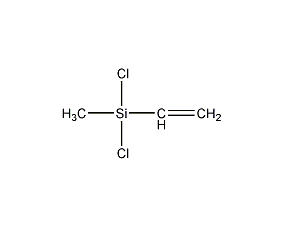
Structural formula
| Business number | 03JG |
|---|---|
| Molecular formula | C3H6Cl2Si |
| Molecular weight | 141.07 |
| label |
Dichlorovinylmethylsilane, Methylvinyldichlorosilane, Dichloromethylvinylsilane, Methylvinyldichlorosilane, aliphatic compounds |
Numbering system
CAS number:124-70-9
MDL number:MFCD00000492
EINECS number:204-710-3
RTECS number:VV3533000
BRN number:1740822
PubChem number:24885961
Physical property data
1. Properties: irritating colorless liquid
2. Boiling point: 93℃
3. Relative density: 1.085
4. Refraction Rate: 1.4270
6. Flash point: 4℃
Toxicological data
Acute toxicity data
Mouse intravenous LD50: 56mg/kg
Ecological data
None
Molecular structure data
1. Molar refractive index: 34.08
2. Molar volume (cm3/mol): 131.6
3. Isotonic specific volume (90.2K): 276.5
4. Surface tension (dyne/cm): 19.4
5. Polarizability (10-24cm3): 13.51
Compute chemical data
1. Reference value for hydrophobic parameter calculation (XlogP):
2. Number of hydrogen bond donors: 0
3. Number of hydrogen bond acceptors: 0
4. Number of rotatable chemical bonds: 1
5. Number of tautomers:
6. Topological molecular polar surface area (TPSA): 0
7. Number of heavy atoms: 6
8. Surface charge: 0
9. Complexity: 59.8
10. Number of isotope atoms: 0
11. Determine the number of atomic stereocenters: 0
12. Uncertain number of atomic stereocenters: 0
13. Determine the number of chemical bond stereocenters : 0
14. Number of uncertain chemical bond stereocenters: 0
15. Number of covalent bond units: 1
Properties and stability
Basic properties: Easy to hydrolyze, releasing hydrogen chloride and generating condensate of methyl vinyl silicone diol. Vapors and liquids can cause skin burns and are toxic if inhaled. Reacts with absolute ethanol to release hydrogen chloride and generate methyl vinyl diethoxysilane. Reacting with organic magnesium halide, the chlorine atom in the Si-Cl bond can be replaced by the corresponding organic group. In the presence of platinum catalyst, Si-CH=CH2 bonds can interact with Si-H bonds.��Compounds undergo addition reactions.
Storage method
.Storage: Store sealed in a dry and ventilated place. Keep out of contact with humid air.
Synthesis method
Brief description of production method: It can be prepared by reacting methyltrichlorosilane and vinyl magnesium bromide
Purpose
Usage: Used to synthesize silicone intermediates and high molecular polymers such as silicone oil and silicone rubber.

 微信扫一扫打赏
微信扫一扫打赏

